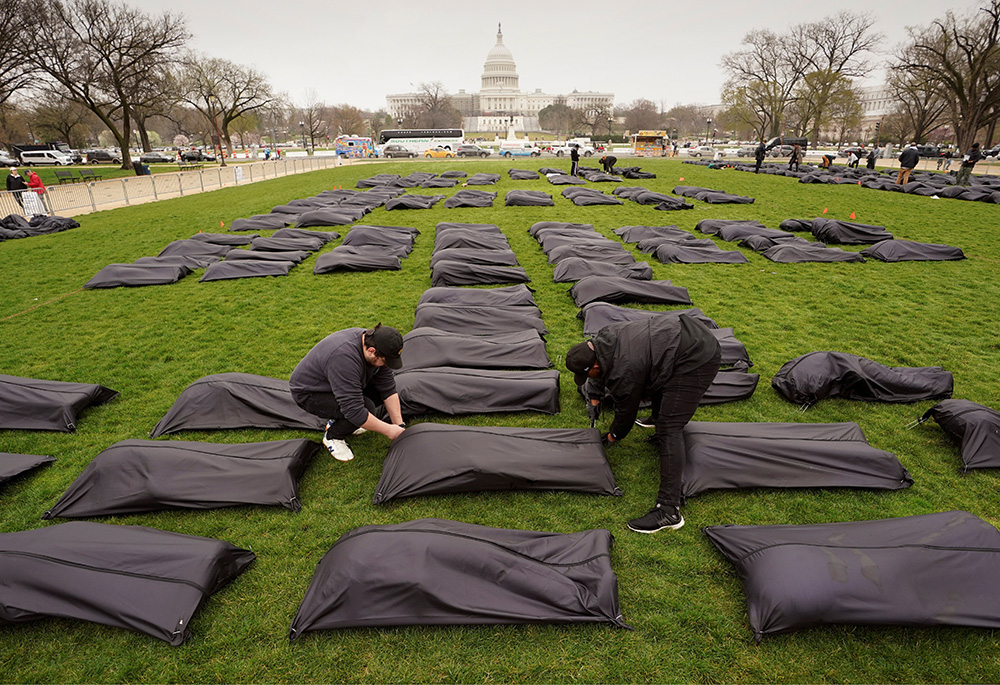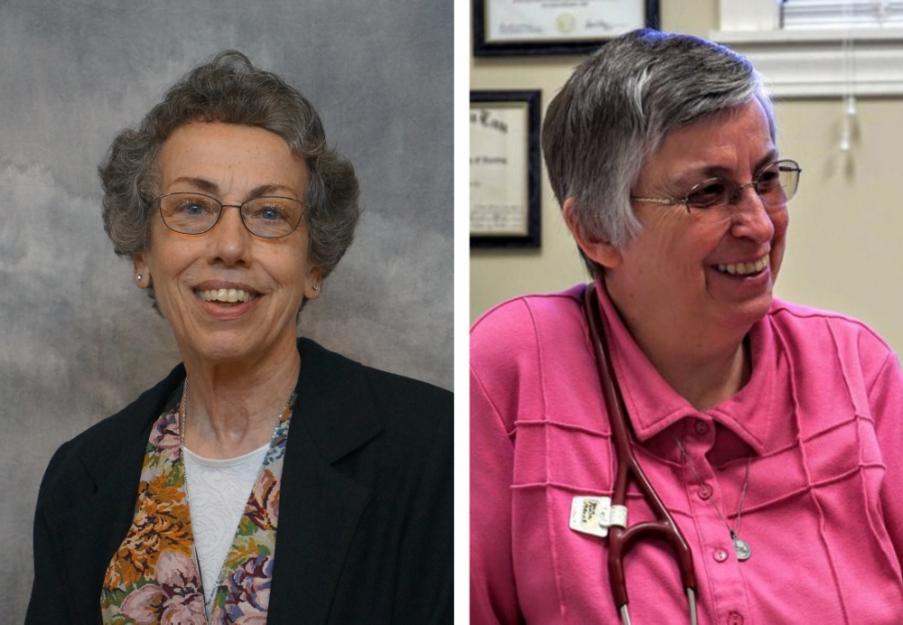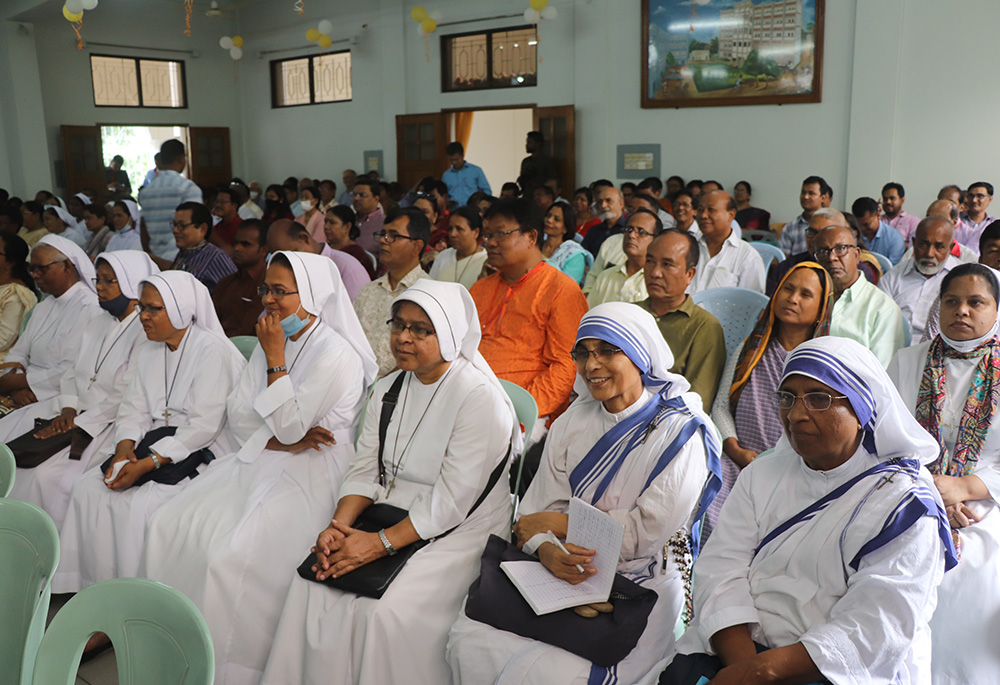
Body bags are placed on the National Mall in Washington near the U.S. Capitol on March 24. (CNS/Reuters/Kevin Lamarque)

Six communities of women religious have banded together to speak against gun violence.
In the wake of the May 24 mass shooting at an elementary school in Uvalde, Texas, that killed 19 children and two teachers, the six congregations said that thoughts and prayers are not enough.
The Texas shooting came 10 days after 10 people were shot to death at a supermarket in Buffalo, New York, in what appears to be a racially motivated shooting. On June 1, another mass shooting, at a medical office in Tulsa, Oklahoma, left five people dead, including two doctors.
"How long will we continue to accept mass shooting after mass shooting? How many more small coffins will be wept over, and how many more families will be destroyed?" the congregations asked in their statement. "We CAN take concrete steps to curb gun violence — but it requires action from our elected representatives, an end to partisan bickering and an end to monetary gain at the expense of innocent lives. It requires bravery and compassion — and it requires legislation and enforcement."
The six communities are the Sisters of St. Benedict of Ferdinand, Indiana; the Dominican Sisters of Peace; the Sisters of Charity of Nazareth, Kentucky; the Loretto Community; the Ursuline Sisters of Louisville, Kentucky; and the Ursuline Sisters of Mount St. Joseph, Kentucky.
The statement calls for support of:
- HR 1446, the Enhanced Background Checks Act of 2021, which would require federal firearms licensees to receive a completed background check before giving a person a gun.
- HR 8, the Bipartisan Background Checks Act of 2021, which would expand background checks for all firearm sales or transfers in the country, including private sales.
- HR 1620, the Violence Against Women Act Reauthorization Act of 2021, which would, among other things, prohibit "dating partners" as well as spouses from owning a gun if convicted of domestic violence.
- HR 1808, the Assault Weapons Ban of 2021, which would regulate the ownership of assault weapons.
The communities say they are not against gun ownership, but in favor of common-sense laws to increase gun safety.
"We are not asking for a repeal of the Second Amendment, but rather, to have the right to bear arms to be tempered with the responsibility to use and regulate them wisely," they wrote. "We lift our prayers not only for those lost to gun violence in the past 10 days, but to the 7000+ Americans who have died by gun violence in 2022 alone. We pray, we beg, and we demand that our elected Representatives and Senators ACT TODAY."
Advertisement
Man convicted of murdering two US sisters dies
The man who killed two sisters in rural Mississippi has died in prison.
Rodney Earl Sanders, who was 46 in 2016, when the crime occurred, pleaded guilty to the murders of Sr. Paula Merrill, a member of the Sisters of Charity of Nazareth, and Sr. Margaret Held of the School Sisters of St. Francis in Milwaukee.
Sanders died of cancer May 25 in the infirmary at the Mississippi State Penitentiary in Parchman, according to the Sisters of Charity of Nazareth.
Held and Merrill had lived and worked in the Durant and Lexington area for six years and had ministered to those kept poor for some 30 years, mostly in Mississippi. They were nurse practitioners, and both worked at the Lexington Medical Clinic.
Police checked on the sisters at their home in Durant after they failed to show up for work Aug. 25, 2016. They found signs of a break-in and the bodies of Held and Merrill, who had been stabbed to death.
In June 2018, Sanders was sentenced to two terms of life without parole, plus 30 years for stealing one of the sisters' cars. His guilty plea spared him the chance of the death penalty, which both sisters' communities opposed.

Left: Sr. Margaret Held, 68, a member of the School Sisters of St. Francis in Milwaukee; Right: Sr. Paula Merrill, 68, a member of the Sisters of Charity of Nazareth in Kentucky (CNS/School Sisters of St. Francis and Sisters of Charity of Nazareth)
Sr. Susan Gatz, then president of the Sisters of Charity of Nazareth, said in a statement at Sanders' sentencing hearing that the sisters had forgiven him.
"Mr. Sanders, we will never forget what you did to them and the suffering that has caused so many. But, because we believe in Christ and his gospel, we forgive you," Gatz said in her statement. "We have learned over these couple of years that your life has had much turmoil and pain. We want you to know that we will pray that you can find peace."
Held's sister Jean Knoll told the Washington County (Wisconsin) Insider her family had forgiven Sanders.
"If you're a good person, we couldn't hold that hatred towards him for taking our sister. Because we knew she would have forgiven him. We just had sympathy and pity for him," she said.
"As a family, we decided to forgive him for what he did. It doesn't take the pain away or anything you know love and forgiveness is a much better thing in America and my sister, Margaret, had 68 years of living a good life, loving God and loving the people she took care of."
The Sisters of Charity of Nazareth asked for prayers for everyone involved.
"Let us pray for him, his family, and the family and friends of Sisters Paula and Margaret," the statement said, to which a sister replied: "I believe Paula and Margaret were there to welcome him into heaven."
Bangladeshi sister: Bishops, priests should provide more support
Sr. Shikha Laetitia Gomes, a member of the Sisters of the Holy Cross, expects more support from Catholic bishops and priests.
Gomes was one of several leaders to speak at the daylong golden jubilee celebration of the Catholic Bishops' Conference of Bangladesh on May 27 in Dhaka. An estimated 2,000 Catholics, including bishops and around 50 nuns, attended the celebration.
"To be an important part of pastoral work, nuns need to have timely education, higher education, theology study and other training," she said.
"We want nuns to be representatives in the diocese and parish council," she added. "Bishops and priests should give respect and dignity to women religious. They should give value to nuns' experiences and wisdom."
Gomes, who is also principal of Holy Cross College, one of the country's top colleges for women, noted that Bangladesh's Parliament has seats that are reserved for women.
"As women, we nuns also ask to reserve seats in the church's various committees," she said. "In seminaries and formation houses, seminarians need to learn that nuns are their colleagues."

Women religious participate in the daylong golden jubilee celebration of the Catholic Bishops' Conference of Bangladesh on May 27 in Dhaka, Bangladesh. (Sumon Corraya)
Nuns and Nones webinars on land justice
This month, Nuns and Nones will offer several webinars through its Land Justice Learning Platform. The online events are free, and those who sign up will receive a recording of the event.
- "Legal Tools for Spirit-Centered Land Transitions" with Janelle Orsi and Alejandra Cruz: "Join the Sustainable Economies Law Center in a follow-up session from Session 5 of Land Justice Futures. Janelle Orsi and Alejandra Cruz will not only guide us through some helpful legal terms and tools for land transition, but they will also [help] our minds to think more creatively about how to get creative — and prophetic — when it comes to dealing with the land and law." The 90-minute event begins at 3:30 p.m. Eastern time June 15.
- "Land Trusts: Possibilities Beyond the Standard" with Ian McSweeney of Agrarian Trust: "With a wealth of experience in land trusts, land conservation, and financing land transitions, Ian will share about important learnings and innovations with regard to protecting land. He will also share specifically about the innovative Agrarian Commons model, which conserves land while expanding equity and access to farmers; as well as examples of how people have put their land to the Commons." The 90-minute event begins at 1 p.m. Eastern time June 22.
- "Small Group Conversation Series: Listening to the Land and One Another" with Diana Marin. This three-part series will explore the "contemplative space around land justice and some theologies it raises. Over three sessions, participants will reflect upon Resurrection, Jubilee, and Evolutionary Consciousness." The sessions will be led by Marin, Nuns and Nones' theologian in residence, and "will be best suited for people who desire personal and communal reflection on the challenges and opportunities around land justice, and what they illuminate about the sacred." The series runs from 1 p.m. to 2:30 p.m. Eastern time on June 9, June 23 and July 7. The sessions are limited to 20 participants, and attendance at all three sessions is required, as it will not be recorded.

The land protected by the Dominican Sisters' conservation easement overlooks the Hudson River. (EarthBeat photo/Chris Herlinger)
Wheaton Franciscans get their own day
June 11 in DuPage County, Illinois, will be Wheaton Franciscans Day as the order celebrates its 75th year in Wheaton, in the western suburbs of Chicago, and its 150th year in the United States.
The international congregation, officially known as the Franciscan Sisters, Daughters of the Sacred Hearts of Jesus and Mary, will mark the occasion with a day of music, art, food and guided tours of the campus, including the peace path around the natural Illinois prairie, butterfly garden, and cosmic walk, which features watercolor images of significant moments of the unfolding of the universe.
A statement from the Wheaton Franciscans says the proclamation of Wheaton Franciscans Day recognizes the ways the sisters have impacted DuPage County, including the founding of Marianjoy Rehabilitation Hospital; the development of affordable and special-needs housing; a commitment to spiritual growth through the Tau Center; and their long-term and ongoing commitment to justice, peace, and the integrity of creation.
[Sumon Corraya in Bangladesh contributed to this Monday Starter.]







